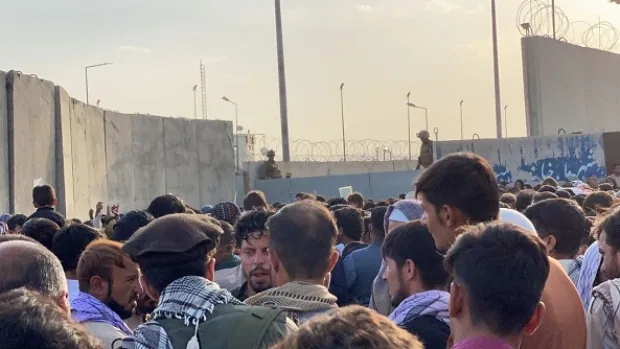The latest on Afghanistan:
Western nations rushed to complete the evacuation of thousands of people from Afghanistan on Wednesday as the Aug. 31 deadline for the withdrawal of foreign troops drew closer with no sign that the country’s new Taliban rulers might allow an extension.
In one of the biggest such airlifts ever, the United States and its allies have evacuated more than 70,000 people, including their citizens, NATO personnel and Afghans at risk, since Aug. 14, the day before the Taliban swept into the capital Kabul to bring to an end a 20-year foreign military presence.
U.S. President Joe Biden said U.S. troops in Afghanistan faced mounting danger and aid agencies warned of an impending humanitarian crisis for the population left behind.
“I feel very hopeless that I’m stuck here.”
The story of Maryam, a Canadian citizen, and her husband Ahmad — a doctor hiding from the Taliban — and their desperate attempts to get help from the Canadian government in fleeing Afghanistan: https://t.co/LPf0QjvbSZ pic.twitter.com/XI6nuv9rWF
Biden said they were on pace to meet the deadline, set under an agreement struck with the Islamist group last year to end America’s longest war.
“The sooner we can finish, the better,” Biden said on Tuesday. “Each day of operations brings added risk to our troops.”
Tens of thousands of Afghans fearing persecution have thronged Kabul’s airport since the Taliban takeover, the lucky ones securing seats on flights.
Many people milled about outside the airport — where soldiers from the United States and other nations were trying to maintain order amid the dust and heat — hoping to get out.





They carried bags and suitcases stuffed with possessions, and waved documents at soldiers in the hope of gaining entry. One man, standing knee-deep in a flooded ditch, passed a child to a man above.
“I learned from an email from London that the Americans are taking people out; that’s why I’ve come, so I can go abroad,” said one man, Aizaz Ullah.
While the focus is now on those trying to flee, the risk of starvation, disease and persecution is rising for the rest of the population, aid agencies say.
“There’s a perfect storm coming because of several years of drought, conflict, economic deterioration, compounded by COVID,” David Beasley, executive director of the UN World Food Programme, told Reuters in Doha, calling for the international community to donate $200 million US in food aid.
“The number of people marching toward starvation has spiked to now 14 million.”
U.S. President Joe Biden warned the Taliban to stay out of the way as efforts to rescue people from Afghanistan continue ahead of an Aug. 31 withdrawal of American troops. Biden was firm on the timeline, despite calls from other G7 countries to stay longer to allow for more evacuation flights. 2:39
The EU said this week it was planning to quadruple aid and was seeking co-ordination with the United Nations on delivery as well as safety guarantees on the ground.
The UN human rights chief said she had received credible reports of serious violations by the Taliban, including “summary executions” of civilians and Afghan security forces who had surrendered. The Taliban have said they will investigate reports of atrocities.
The Taliban’s 1996-2001 rule was marked by harsh Sharia law, with many political rights and basic freedoms curtailed and women severely oppressed. Afghanistan was also a hub for anti-Western militants, and Washington, London and others fear it might become so again.
Land routes
A NATO country diplomat in Kabul, who declined to be identified, said several international aid groups were desperate to get Afghan staff out and neighbouring countries should open their land borders to allow more people to leave.
“Iran, Pakistan and Tajikistan should be pulling out far more people using either air or land routes. It’s vital air and land routes are used at a very fast pace,” the diplomat told Reuters.
The Taliban said all foreign evacuations must be completed by Aug. 31, and asked the United States to stop urging talented Afghans to leave, while also trying to persuade people at the airport to go home, saying they had nothing to fear.
“Foreign troops should withdraw by the deadline. It will pave the way for resumption of civilian flights,” Taliban spokesperson Suhail Shaheen said on Twitter.
“People with legal documents can travel through commercial flights after Aug. 31.”
The U.S.-backed government collapsed as the United States and its allies withdrew troops two decades after they ousted the Taliban in the weeks after the Sept. 11, 2001, attacks on the United States by al-Qaeda, whose leaders had found safe haven in Taliban-ruled Afghanistan.
Taliban leaders have begun talks on forming a government.



